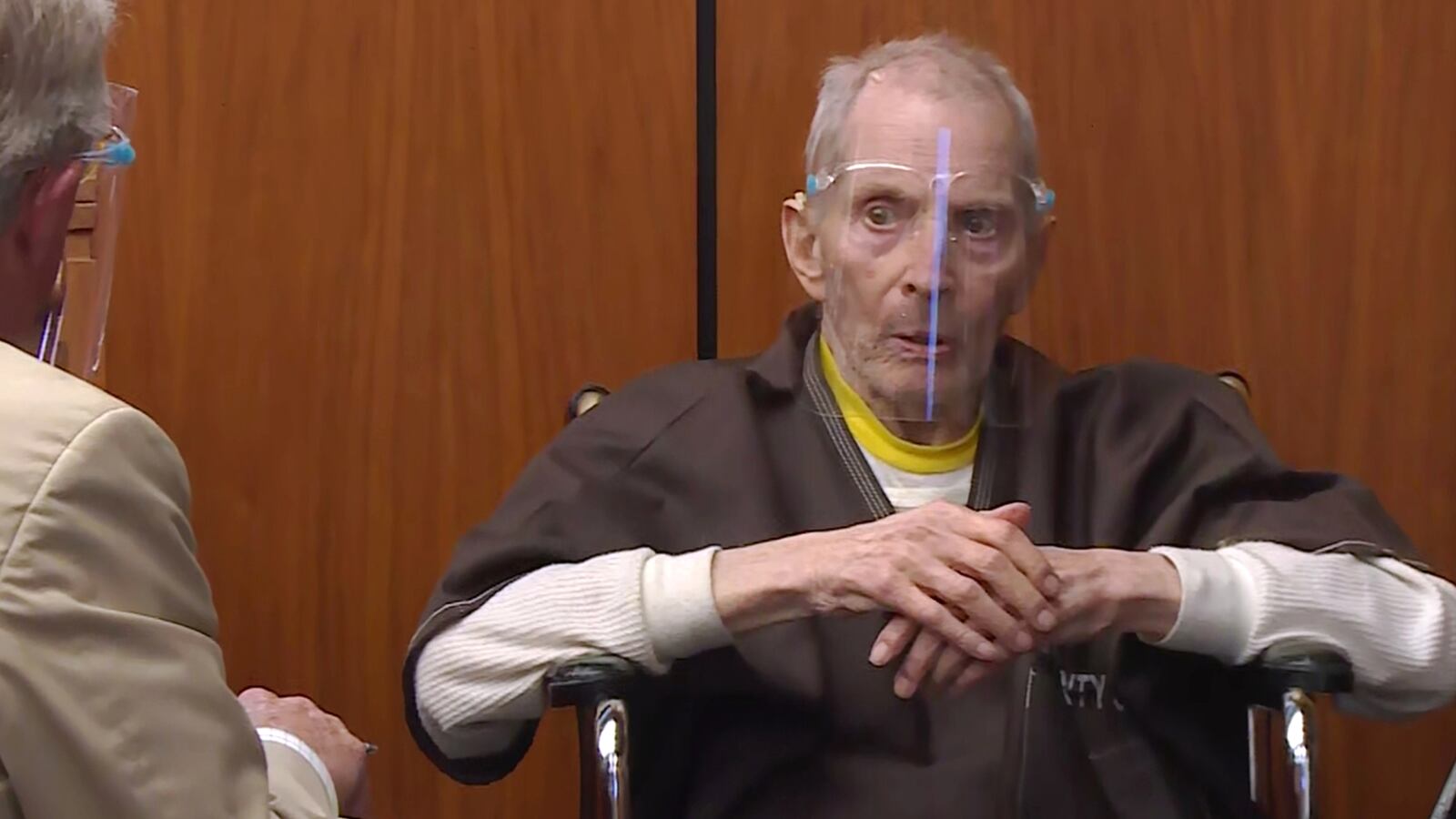Andrew Jarecki’s original 2015 docuseries The Jinx was about whether Robert Durst killed three different people: his first wife Kathie, who went missing in 1982; his best friend Susan Berman, who was executed in 2000; and his neighbor Morris Black, whom he admitted to dismembering in 2001. The Jinx—Part Two, meanwhile, has to this point been about his arrest and trial, both of which have long been public record. Consequently, unlike its predecessor, it hasn’t been building to a jaw-dropping bombshell. Instead, as its closing episode confirmed, it’s always been something more depressingly chilling: a portrait of rampant, repugnant complicity.
Unsurprisingly, tonight’s season (and series) finale focused less on Durst’s death behind bars—an already known fact—than on how he managed, for decades and in the face of overwhelming evidence of guilt, to weasel his way out of trouble. The simple answer, it turns out, is money, which buys support, silence, lies, and the morality of the weak, manipulatable, and greedy. It’s a case study of the fact that, for a particular kind of monster, selling one’s soul to the devil is a very good deal.
The Jinx—Part Two’s penultimate installment concluded with the question of why Durst’s second wife Debrah Lee Charatan—who sent her attorney Alan Abramson to the trial in her place—needed a lawyer at all, much less one who was present in court. This mystery speaks to the series’ primary argument: namely, that rather than a “lone wolf” who got away with murder on his own (until he didn’t), Durst was a fiend who used his wealth and power to amass a cabal of conspirators. It’s fitting, then, that following his sentencing hearing, during which he receives life in prison without the possibility of parole, he’s largely abandoned by his friends and former cohorts, whom he cries out to in messages left on answering machines in his pitifully gravelly, frail voice (Stewie! Susie! Debrah!). Finally, the killer is alone.
In basic narrative terms, that’s the end of the saga of Robert Durst, who died of cardiac arrest on Jan. 10, 2022—a piece of news that Jarecki receives on camera during an interview with New York magazine correspondent Lisa DePaulo. In a cruel twist, because Durst perished before he could mount an initial appeal, California law stipulates that his conviction be vacated. This unfair technicality hits Kathie’s long-suffering brother Jim hard, although it doesn’t halt his burning desire to hold the Dursts accountable for the murder of his sister. On the contrary, Jim proceeds with a $100 million wrongful death civil suit (led by lawyer Matthew Capozzoli) against Durst’s estate, which is now fully controlled by Debrah.
The McCormacks’ litigation requires Capozzoli and his colleagues to depose Debrah as well as members of the Durst Organization, and video footage of those interviews allows The Jinx—Part Two to prove its thesis that Durst’s criminal-justice evasions were facilitated by the craven and self-interested individuals around him. After close to 40 years of never speaking about Kathie’s disappearance—on the record, or to the McCormacks—Durst’s siblings Douglas, Wendy, and Tom are all forced to talk about their brother. Despite their caginess, what they more or less reveal is that Durst was always a violent and unpleasant creep who they suspected had played a part in Kathie’s vanishing.

Jim McCormack and Sharon McCormack.
HBODurst’s relatives clearly rallied together to stay quiet because they feared him and it served them best, and similar motivations guided Debrah during the course of her marriage to the real-estate scion. The Jinx—Part Two demonstrates that theirs was a union of convenience, to the point that Debrah had for years been involved with another man, Steven Holm, with whom she lived until his passing in 2019. With the same patient, methodical incisiveness that’s marked his entire true-crime opus, Jarecki lays out how Debrah, in the late ’90s, fell on hard times with her business and, via Nick Chavin, set her sights on Durst as her financial savior. Their ensuing arrangement was one in which Durst provided her with the funds necessary to first stay afloat, and then to thrive as a real-estate industry force in her own right. What she got was a sugar daddy. What he got in return, the series contends, was just as valuable: a right-hand accomplice and confidant who would know, and help him protect, his homicidal secrets.
Debrah’s deposition leaves no doubt that she didn’t love Durst. Rather, she stayed with him (despite three separate murder accusations!) because remaining loyal meant that she’d eventually inherit his enormous trust, which (as prison phone calls elucidate) he set up to protect from civil lawsuits like the one Jim filed, and which she coveted above all else. That account was the price tag for Debrah’s assistance, just as it paid for the collusion of everyone else in Durst’s orbit, be it Stewart Altman, Chris Lovell, or Susie Giordano, who appears to have pocketed de facto bribes before taking the stand in his 2021 trial. Nonetheless, even with Durst in the ground, Susie refuses to admit that he was a killer in The Jinx—Part Two, illustrating just how far a dollar goes in purchasing allegiance. For Chavin, on the other hand, guilt over his lies and silence ultimately weighs on him like a ton of bricks, albeit not to the point of making him turn on his former friend; in a final interview before his own death, he twitches, complains of dizziness, and yet stops short of saying what he’s seemingly thinking.
“These people have really gone through hell, even if they caused some of it themselves,” says DePaulo near the end of The Jinx—Part Two, but Jarecki elicits no tears for their self-made circumstances, especially given that Debrah’s gambit worked out perfectly for her. Now fabulously wealthy, she’s earned the fruits of her complicit labor. Asked in her deposition whether it was all worth it, she confesses, “I think it was.” In doing so, she reveals the depths of her greed and, by extension, the irresistible power of money. For Debrah, as well as for a few of Durst’s buddies, the Faustian bargain was a lucrative success.







